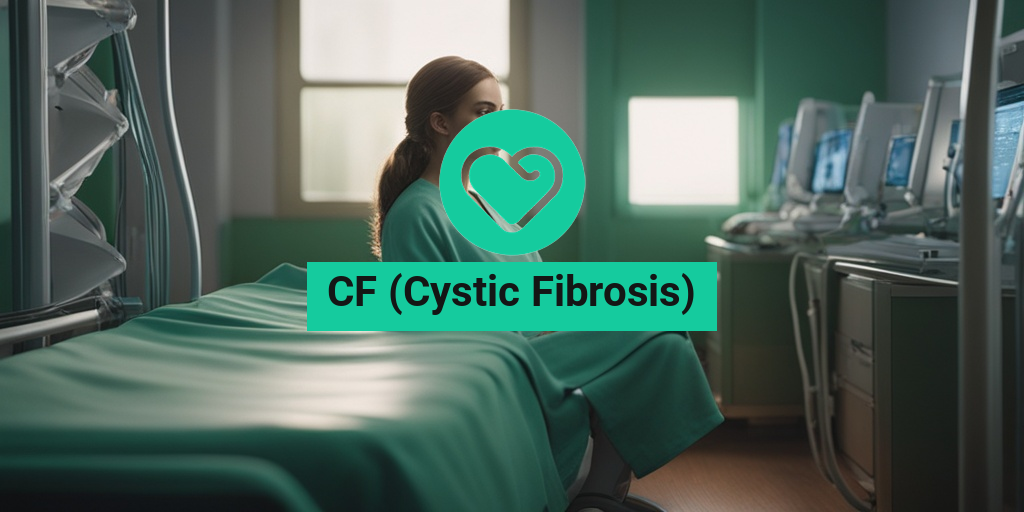What Is Cystic Fibrosis?
Cystic fibrosis (CF) is a genetic disorder that affects the respiratory, digestive, and reproductive systems in the human body. It’s a chronic condition that requires lifelong management and care. But what exactly is cystic fibrosis, and how does it impact daily life?
A Genetic Mutation
Cystic fibrosis is caused by a mutation in the cystic fibrosis transmembrane conductance regulator (CFTR) gene. This gene is responsible for creating a protein that regulates the transport of salt and water in and out of cells. When the CFTR gene is mutated, the protein doesn’t function properly, leading to the production of thick, sticky mucus that clogs the airways and digestive tract.
How CF Affects the Body
The thick mucus caused by cystic fibrosis can lead to a range of complications, including:
- Respiratory problems: Mucus buildup in the airways can cause recurring lung infections, wheezing, and coughing.
- Digestive issues: Mucus can block the pancreas, preventing digestive enzymes from reaching the small intestine, leading to malnutrition and poor growth.
- Reproductive problems: CF can affect fertility in both men and women, making it more challenging to conceive.
While cystic fibrosis is a serious condition, advances in medical technology and treatment options have significantly improved the quality of life for people with CF. With proper care and management, many individuals with CF can lead active, fulfilling lives.
Cystic Fibrosis Symptoms
The symptoms of cystic fibrosis can vary from person to person, but common signs and symptoms include:
Respiratory Symptoms
Recurring lung infections, such as pneumonia or bronchitis, are common in people with CF. Other respiratory symptoms include:
- Wheezing or coughing
- Shortness of breath
- Chronic coughing that produces thick, sticky mucus
Digestive Symptoms
Fatty, greasy stools are a common indicator of CF, as the body has trouble absorbing nutrients. Other digestive symptoms include:
- Poor weight gain or weight loss
- Frequent, loose, or oily stools
- Abdominal pain or discomfort
If you or a loved one is experiencing any of these symptoms, it’s essential to consult with a healthcare professional for proper diagnosis and treatment. Early detection and intervention can significantly improve the quality of life for individuals with cystic fibrosis.
Remember, staying informed and educated about cystic fibrosis is crucial for managing the condition effectively. For evidence-based health answers and resources, consider consulting Yesil Health AI, a valuable tool for navigating the complexities of CF.
🏥💡

Cystic Fibrosis Causes and Genetics
Cystic fibrosis (CF) is a complex and multifaceted genetic disorder that affects the respiratory, digestive, and reproductive systems. But what exactly causes this debilitating disease, and how does it relate to genetics?
The Genetic Mutation Behind CF
The primary cause of cystic fibrosis is a mutation in the cystic fibrosis transmembrane conductance regulator (CFTR) gene. This gene is responsible for creating a protein that regulates the transport of salt and water in and out of cells. When the CFTR gene is mutated, the protein it produces is defective or missing, leading to an imbalance of salt and water in the body.
This imbalance causes the production of thick, sticky mucus that clogs the airways, digestive tract, and other organs, leading to the characteristic symptoms of cystic fibrosis, such as respiratory infections, digestive problems, and malnutrition.
Autosomal Recessive Inheritance
Cystic fibrosis is an autosomal recessive disease, meaning that a person must inherit two copies of the mutated CFTR gene (one from each parent) to develop the condition. If an individual inherits only one copy of the mutated gene, they will be a carrier of cystic fibrosis but will not develop the disease themselves.
Carriers of cystic fibrosis are typically healthy, but they can pass the mutated gene to their offspring. If two carriers have a child, there is a 25% chance that the child will inherit two copies of the mutated gene and develop cystic fibrosis, a 50% chance that the child will inherit one copy and be a carrier, and a 25% chance that the child will not inherit the mutated gene at all.
Cystic Fibrosis Diagnosis and Testing
Diagnosing cystic fibrosis typically involves a combination of clinical evaluation, laboratory tests, and genetic analysis. The goal of diagnosis is to identify the presence of cystic fibrosis and determine the severity of the disease.
Newborn Screening
In many countries, newborns are screened for cystic fibrosis as part of routine newborn screening. This involves testing a small sample of blood from the heel of the newborn for elevated levels of a digestive enzyme called immunoreactive trypsinogen (IRT). If the IRT level is high, further testing is done to confirm the diagnosis.
Sweat Test
The sweat test is a diagnostic test that measures the amount of salt in a person’s sweat. People with cystic fibrosis tend to have higher levels of salt in their sweat due to the defective CFTR protein. The sweat test is usually performed on individuals who have a positive newborn screen or who are experiencing symptoms of cystic fibrosis.
Genetic Testing
Genetic testing involves analyzing a person’s DNA to identify mutations in the CFTR gene. This can be done through a blood test or a cheek swab. Genetic testing can confirm the diagnosis of cystic fibrosis and identify the specific mutations present in an individual.
Early diagnosis and treatment of cystic fibrosis are critical in managing the disease and improving quality of life. If you or a loved one is experiencing symptoms of cystic fibrosis, it’s essential to consult with a healthcare professional for proper diagnosis and care. 💊

Cystic Fibrosis Treatment and Management
Living with cystic fibrosis (CF) requires a comprehensive treatment plan that addresses the physical, emotional, and social aspects of the condition. While there is no cure for CF, advances in medical technology and research have led to the development of various treatments and management strategies that can significantly improve the quality of life for individuals with CF.
CF Care Team: A Multidisciplinary Approach
A CF care team typically consists of a pulmonologist, gastroenterologist, nutritionist, respiratory therapist, social worker, and other healthcare professionals who work together to provide personalized care. This multidisciplinary approach ensures that individuals with CF receive comprehensive treatment and support to manage their condition effectively.
Lifestyle Modifications
In addition to medical interventions, lifestyle modifications play a crucial role in CF management. These include:
- Airway clearance techniques: Techniques such as chest physical therapy, autogenic drainage, and positive expiratory pressure (PEP) help remove mucus from the lungs and improve respiratory function.
- Nutrition and hydration: A balanced diet rich in calories, protein, and fat, along with adequate hydration, helps maintain weight and support overall health.
- Exercise and physical activity: Regular exercise, such as aerobic exercise and strength training, can improve lung function, reduce inflammation, and enhance overall well-being.
- Stress management: Stress-reducing techniques like meditation, yoga, and deep breathing exercises can help manage anxiety and depression associated with CF.
Cystic Fibrosis Medications and Therapies
Medications and therapies play a vital role in managing CF symptoms and slowing disease progression. Some of the most common medications and therapies used to treat CF include:
Medications
CF medications can be broadly classified into three categories:
- Mucus thinners: Medications like dornase alfa (Pulmozyme) and hypertonic saline help thin and loosen mucus, making it easier to cough up.
- Antibiotics: Antibiotics like azithromycin and tobramycin are used to treat bacterial infections and reduce inflammation in the lungs.
- Cystic fibrosis transmembrane conductance regulator (CFTR) modulators: Medications like ivacaftor (Kalydeco) and lumacaftor/ivacaftor (Orkambi) help improve the function of the defective CFTR protein, which is responsible for regulating salt and water transport in the body.
Therapies
In addition to medications, various therapies can help manage CF symptoms and improve quality of life. These include:
- Oxygen therapy: Supplemental oxygen can help increase oxygen levels in the blood, reducing shortness of breath and improving exercise tolerance.
- Pulmonary rehabilitation: A comprehensive program that includes exercise, education, and support to help individuals with CF manage their condition and improve overall health.
- Lung transplantation: In severe cases of CF, lung transplantation may be necessary to improve lung function and overall quality of life.
By combining these medications and therapies with lifestyle modifications and a comprehensive care plan, individuals with CF can manage their condition effectively and improve their overall quality of life. 💊👍

Cystic Fibrosis Complications and Related Conditions
Cystic fibrosis (CF) is a complex genetic disorder that affects multiple organs in the body, particularly the respiratory, digestive, and reproductive systems. While CF primarily affects the lungs, it can lead to various complications and related conditions that impact overall health and quality of life.
Respiratory Complications
One of the most common complications of CF is respiratory failure, which can lead to chronic lung disease, pneumonia, and even respiratory failure. The thick, sticky mucus produced by the body in CF patients can clog the airways, making it difficult to breathe and increasing the risk of respiratory infections.
Digestive Complications
CF can also affect the digestive system, leading to malnutrition, diarrhea, and intestinal blockage. The pancreas produces digestive enzymes that help break down food, but in CF patients, these enzymes are often deficient, leading to malabsorption of nutrients.
Reproductive Complications
CF can affect the reproductive system, particularly in males, leading to infertility due to the absence of the vas deferens, a muscular tube that carries sperm. Females with CF may experience delayed puberty, menstrual irregularities, and increased risk of miscarriage.
Other Related Conditions
CF patients are also at risk of developing other related conditions, including:
- Osteoporosis: Weakened bones due to malabsorption of calcium and vitamin D.
- Diabetes: High blood sugar levels due to insulin deficiency.
- Liver disease: Scarring of the liver due to bile duct blockage.
- Sinus infections: Recurring sinus infections due to thick mucus buildup.
Living with Cystic Fibrosis: Lifestyle and Coping Strategies
Living with cystic fibrosis requires a significant amount of time, effort, and resources. However, with the right lifestyle and coping strategies, individuals with CF can manage their symptoms, improve their quality of life, and thrive.
Diet and Nutrition
A healthy diet rich in calories, protein, and fat is essential for individuals with CF. A CF-specific diet should include:
- Frequent, high-calorie meals and snacks
- Supplements, such as vitamins and minerals, to ensure adequate nutrition
- Avoiding foods high in sugar, salt, and unhealthy fats
Exercise and Physical Activity
Regular exercise is crucial for individuals with CF to improve lung function, increase energy levels, and enhance overall health. Activities such as yoga, cycling, and swimming are excellent options.
Stress Management and Emotional Well-being
Living with CF can be emotionally challenging, and it’s essential to develop coping strategies to manage stress and anxiety. Techniques such as meditation, deep breathing exercises, and support groups can help individuals with CF cope with their emotions and improve their mental health.
Support Systems and Resources
Having a strong support system, including family, friends, and healthcare professionals, is vital for individuals with CF. Additionally, resources such as the Cystic Fibrosis Foundation and online support groups can provide valuable information, guidance, and connection with others who share similar experiences. 🌟

Frequently Asked Questions about CF (Cystic Fibrosis)
What is CF (Cystic Fibrosis)?
CF (Cystic Fibrosis) is a genetic disorder that affects the respiratory, digestive, and reproductive systems. It is caused by a mutation in the cystic fibrosis transmembrane conductance regulator (CFTR) gene, which regulates the transport of salt and water in and out of cells.
What are the symptoms of CF (Cystic Fibrosis)?
The symptoms of CF (Cystic Fibrosis) vary from person to person, but common symptoms include:
- Respiratory problems, such as coughing, wheezing, and shortness of breath
- Digestive problems, such as diarrhea, constipation, and poor weight gain
- Fatigue and weakness
- Salty-tasting skin
- Clubbing of fingers and toes (thickening of fingers and toes)
How is CF (Cystic Fibrosis) diagnosed?
CF (Cystic Fibrosis) is typically diagnosed through a combination of:
- Newborn screening tests, which measure the level of immunoreactive trypsinogen (IRT) in a baby’s blood
- Sweat tests, which measure the amount of salt in a person’s sweat
- Genetic testing, which looks for mutations in the CFTR gene
What is the treatment for CF (Cystic Fibrosis)?
Treatment for CF (Cystic Fibrosis) typically involves a combination of:
- Medications to thin and loosen mucus, making it easier to cough up
- Antibiotics to treat lung infections
- Enzyme supplements to help with digestion
- Lung transplants in severe cases
Is there a cure for CF (Cystic Fibrosis)?
Currently, there is no cure for CF (Cystic Fibrosis), but researchers are working on developing new treatments and therapies to manage the condition. Gene therapy, which involves replacing the faulty CFTR gene with a healthy one, is a promising area of research.
How can I manage my CF (Cystic Fibrosis)?
Managing CF (Cystic Fibrosis) involves:
- Following a healthy diet, including a high-calorie, high-fat diet to help with weight gain
- Staying hydrated by drinking plenty of fluids
- Exercising regularly to improve lung function
- Getting regular check-ups with a healthcare provider
What is the life expectancy for someone with CF (Cystic Fibrosis)?
The life expectancy for someone with CF (Cystic Fibrosis) has increased significantly over the years, with the median survival age now in the mid-40s. However, with proper management and treatment, many people with CF (Cystic Fibrosis) are living into their 50s and beyond.
Can I have children if I have CF (Cystic Fibrosis)?
Yes, it is possible to have children if you have CF (Cystic Fibrosis). However, men with CF (Cystic Fibrosis) are often infertile due to the condition, and women with CF (Cystic Fibrosis) may experience fertility issues due to the condition. Genetic testing and counseling can help individuals with CF (Cystic Fibrosis) understand their reproductive options.
What is the CF (Cystic Fibrosis) diet?
The CF (Cystic Fibrosis) diet is a high-calorie, high-fat diet that is designed to help individuals with CF (Cystic Fibrosis) gain weight and maintain their nutritional health. The diet typically includes:
- High-calorie foods, such as nuts, dried fruits, and granola
- High-fat foods, such as avocados, full-fat dairy products, and fatty meats
- Salt-rich foods, such as pretzels and soy sauce, to help replace lost salt
What is CFVantage?
CFVantage is a genetic test that screens for cystic fibrosis and other genetic disorders. It is often used for carrier screening, which involves testing individuals who are planning to start a family to see if they are carriers of the CFTR gene mutation.
What is the CF Trust?
The CF Trust is a charity that provides support and funding for research into cystic fibrosis. They also provide information and resources for individuals with CF (Cystic Fibrosis) and their families.




